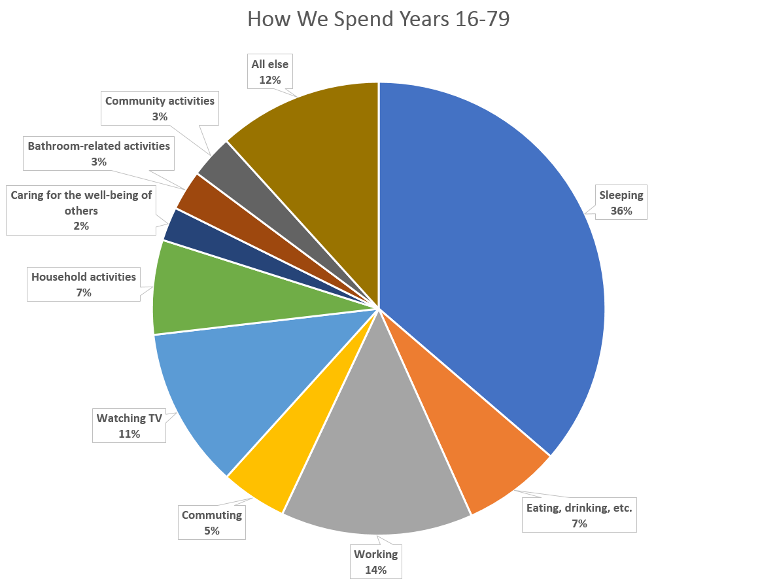Do you feel like you don’t have enough time in life for what matters most to you? If so, you might appreciate the following video. I saw it for the first time about a week ago. The video shows how the average American spends the 28,835 days of his or her life.
Some who watch the video find it depressing. But that needn’t be the takeaway. In this post I’ll consider how it can inspire us to make the most of our time.
Video Recap in a Chart
28,835 days is the equivalent of 79 years. That’s approximately how long the average American lives.
If I understand the video correctly, the author first removes 5,475 jelly beans, which represent the first 15 years of life. He then says how many of the remaining 23,360 days people spend in the following 10 categories of activity:

Why a Snapshot of our Days Can Seem Depressing
It can be depressing to face our mortality, especially when we see how quickly those 28,835 days can pass.
And it can be really depressing to think: I have so little free time. After doing everything I have to do, I have so little time left for what I want to do. Only 12% of my days are available for “all else.”
But it’s possible to draw a very different conclusion from the video. I propose the following interpretation:
How to Make the Most of Our 28,835 Days
The big mistake is to think you only have 12% of your life to do the things you care about. True, you don’t have 100% of your days. Not even close, because of the need to sleep. But you have way more than 12%.
In fact, it’s possible to pursue what matters most to you during the majority of your life. Let’s go category by category to consider how:
-
Sleeping (36%)
This is the area over which we have the least control. In a future post, I plan to discuss how we can make the most even of sleep. But for the sake of this post, let’s assume that we can’t have much influence on this category.
-
Eating, drinking, etc. (7%)
In today’s world it is all too easy to scarf down a quick meal on the go. And sometimes that’s necessary.
But since everyone has to eat, striving to share meals with loved ones is a relatively easy way to add meaning to their lives and yours. Loved ones and friends are our life’s companions. But did you know that “companions” comes from the Latin com “with, together” + panis (bread)? Companions are those who eat together.
-
Working (14%)
Not everyone has a choice of work. Especially not at first.
But over time, moving yourself toward a job that taps into your interests and abilities can be a powerful means of pursuing what matters most to you. You get to collaborate with others who share your interests. You get to stretch yourself to the limits of your capability. And, as I mentioned in my post on “deep work,” you get to do something you were born to do.
-
Commuting (5%)
If you went to college, consider this: you will spend almost the exact same amount of time commuting as you spent in college. If you use your time in the car to further your learning, you can pick up the equivalent of another degree on the side.
Podcasts are probably the most popular way to learn while commuting. I, however, prefer to have my Kindle read e-books to me, for the reasons I discussed in this post: How to Read 7,000 Pages per Year the Easy Way.
-
Watching TV (11%)
Watching TV is a source of relaxation for many people. Even Aristotle—who was no slouch, to say the least—recognizes that “we need relaxation because we cannot work continuously.”
My wife and I often watch a show before we go to bed. So I’m not fundamentally opposed to TV.
But to spend 11% of one’s life—2.7 hours per day—watching TV? I’m sorry, but I just think we can do better than that. When we’re honest with ourselves, how much does watching TV really contribute to what matters most to us?
At any rate, it would be crazy to watch TV for 11% of one’s life and then to complain about not having enough free time.
-
Household activities (7%)
Household activities like chores and shopping may support what matters most to us but probably don’t contribute directly to it. When that is the case, I’d offer two suggestions.
First, can you do those activities with someone you like to spend time with? In that case, you are furthering a relationship while knocking a task off the list. I often invite my daughter to join me in replacing a light bulb, applying WD-40 to a squeaky hinge, etc. She is always eager to join me, and I get to spend time with her while getting necessary tasks done.
A second suggestion is to outsource some of these activities. Rather than shopping for groceries, have them delivered to you (and save $760 in the process). Or hire administrative help (for as little as $5/hour). Or hire a handyman, house cleaner, or someone to help with yardwork, as I discuss in this post.
-
Caring for the well-being of others (2%)
Caring for loved ones almost certainly already contributes powerfully to what matters most. Doing so often isn’t as immediately enjoyable as activities like eating, drinking, or watching TV. But there is a level of happiness beyond creature comforts that we reach only when we tend to the well-being of others, as I discussed in this post.
-
Bathroom-related activities (3%)
Lo and behold, even these activities can be elevated. 🙂 For instance, I have my iPhone read to me while getting ready for work in the morning—dressing, brushing teeth, etc. I estimate that my iPhone reads to me for 162+ hours/year. Doing so allows me to consume the 10+ blogs that I follow at any given time.
-
Community activities (3%)
Activities involving religious and civic engagements, charities, and taking classes are already likely to contribute to what matters most to those who engage in them.
-
All else (12%)
Having 12% for “all else” only seems depressing if you aren’t pursuing what matters to you in the other 9 areas of life. But if you are, then 12% of your days on top of that seems abundant. It represents 2.8 hours per day, beyond all your other meaningful activities, for additional life-giving time.
Conclusion
Imagine a world where you sleep well. You eat and drink with those you love. You work a job that aligns with your interests. During your commute, you learn as much as you did in 4 years of college. You find ways of relaxing that contribute meaningfully to your life. You outsource household activities or else do them with others whom you want to spend time with. And even during your bathroom-related activities you make progress toward what you find important.
In addition, you care for the well-being of others and engage in meaningful community activities. And on top of all that, you have a few hours per day to spend however else you choose.
Such a life is possible. By being intentional with the time you spend in each of the 10 categories of life, you can pursue what matters most to you for the majority of your 28,835 days.
Question: What is one thing you do in 1 of the 10 categories of life that helps you pursue what matters most to you? You can leave a comment by clicking here.
If you liked this post, why not join the 5,000+ subscribers who receive blog updates on how to have more time and money for what matters most? Sign up here.
